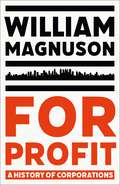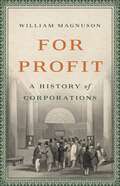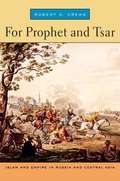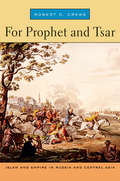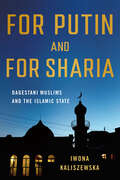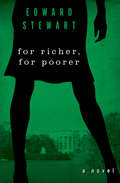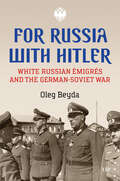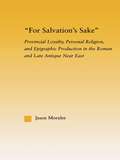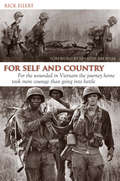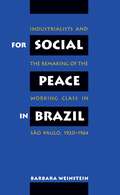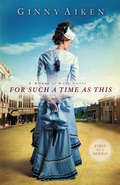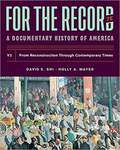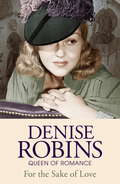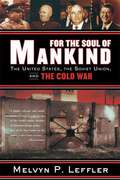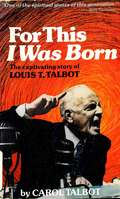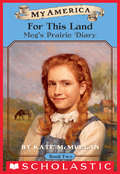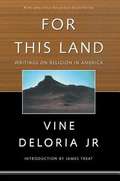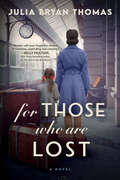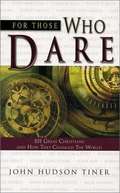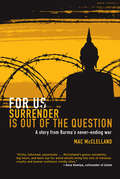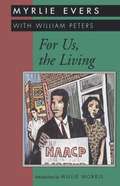- Table View
- List View
For Profit: A History of Corporations
by William MagnusonWe have long been suspicious of corporations recklessly pursuing profit and amassing wealth and power. But the story of the corporation didn't have to be like this. For most of history, they were not amoral entities, but public institutions designed to promote the societies that granted them charter. Magnuson reveals how the corporation has evolved since its beginnings in the ancient world. What happens in this next chapter of the global economy depends on whether we can return to their public-minded spirit, or whether we have sunk irrevocably into the swamp of high profit at all costs. Epic and compelling in scope, For Profit illuminates the roles corporations played, for good and evil, in the making of the modern world.
For Profit: A History of Corporations
by William MagnusonA history of how corporate innovation has shaped society, from ancient Rome to Silicon Valley From legacy manufacturers to emerging tech giants, corporations wield significant power over our lives, our economy, and our politics. Some celebrate them as engines of progress and prosperity. Others argue that they recklessly pursue profit at the expense of us all. In For Profit, law professor William Magnuson reveals that both visions contain an element of truth. The story of the corporation is a human story, about a diverse group of merchants, bankers, and investors that have over time come to shape the landscape of our modern economy. Its central characters include both the brave, powerful, and ingenious and the conniving, fraudulent, and vicious. At times, these characters have been one and the same. Yet as Magnuson shows, while corporations haven&’t always behaved admirably, their purpose is a noble one. From their beginnings in the Roman Republic, corporations have been designed to promote the common good. By recapturing this spirit of civic virtue, For Profit argues, corporations can help craft a society in which all of us—not just shareholders—benefit from the profits of enterprise.
For Prophet And Tsar: Islam And Empire In Russia And Central Asia
by Robert D. CrewsDrawing on police and court records, and Muslim petitions, denunciations and clerical writings - not accessible prior to 1991 - this text unearths the fascinating relationship between an empire and its subjects.
For Prophet and Tsar: Islam and Empire in Russia and Central Asia
by Robert D. CrewsRussia occupies a unique position in the Muslim world. Unlike any other non-Islamic state, it has ruled Muslim populations for over five hundred years. Though Russia today is plagued by its unrelenting war in Chechnya, Russia's approach toward Islam once yielded stability. In stark contrast to the popular "clash of civilizations" theory that sees Islam inevitably in conflict with the West, Robert D. Crews reveals the remarkable ways in which Russia constructed an empire with broad Muslim support. In the eighteenth century, Catherine the Great inaugurated a policy of religious toleration that made Islam an essential pillar of Orthodox Russia. For ensuing generations, tsars and their police forces supported official Muslim authorities willing to submit to imperial directions in exchange for defense against brands of Islam they deemed heretical and destabilizing. As a result, Russian officials assumed the powerful but often awkward role of arbitrator in disputes between Muslims. And just as the state became a presence in the local mosque, Muslims became inextricably integrated into the empire and shaped tsarist will in Muslim communities stretching from the Volga River to Central Asia. For Prophet and Tsar draws on police and court records, and Muslim petitions, denunciations, and clerical writings--not accessible prior to 1991--to unearth the fascinating relationship between an empire and its subjects. As America and Western Europe debate how best to secure the allegiances of their Muslim populations, Crews offers a unique and critical historical vantage point.
For Putin and for Sharia: Dagestani Muslims and the Islamic State (NIU Series in Slavic, East European, and Eurasian Studies)
by Iwona KaliszewskaFor Putin and for Sharia examines what it means to support sharia in twenty-first-century Dagestan, where calls for an Islamic state coexist with nostalgia for the days of Stalin's rule and Mecca calendars hang alongside portraits of Putin. Confronting existing narratives about sharia, terrorism, and anti-terrorism through ethnographic fieldwork, Iwona Kaliszewska looks at the beliefs and practices of Dagestani Muslims, revealing that the pursuit of sharia can assume a range of forms from sweeping visions of an Islamic state imposed through violence, to minor acts of everyday resistance against injustice, to attempts to restore the security and stability once afforded by the Soviet state. In For Putin and for Sharia, Kaliszewska challenges the official dichotomy of Muslims as supporting either the political underground or state authorities and deconstructs the Salafi/Sufi division between the so-called reformists and traditional Islam.
For Richer, for Poorer: A Novel
by Edward StewartSet against four tumultuous decades of American history, For Richer, for Poorer is a spellbinding saga of betrayal and love . . . and one woman&’s quest for revengeThe day a brutal massacre turns Bartonville into a battlefield, Kitty is living with her father in a shack owned by the town&’s most powerful family. When the bloodshed is over, the boy Kitty loves lies fatally wounded. But their child will live on. And Tyrone Duncannon&’s death will be avenged.For Richer, for Poorer is the story of Kitty Kellogg Stokes, born into a hardscrabble life in small-town Pennsylvania, who rose to become the most influential woman in the political circles of New York and Washington, DC. When Kitty marries John Stokes Jr., she bears him two sons. So begins a deception that will continue for decades and test the limits of a woman&’s desire for revenge—and a mother&’s love.
For Russia with Hitler: White Russian Émigrés and the German-Soviet War
by Oleg BeydaThe Bolshevik takeover of Russia created an alternative Russia in exile that never laid down its arms. For two decades, expelled White Russians sought ways to retaliate against the Soviet Union and return home. Their irreconcilability was galvanized by a superstructure, the dominant military organization, the Russian All-Military Union (ROVS). Eventually, militant anti-Bolshevism led the exiled Russians into alliance with Nazi Germany, despite the latter’s anti-Slavic stance. For Russia with Hitler tells the story of how thousands of White Russian émigrés joined the German invasion of the Soviet Union as soldiers, translators, and civilian workers. Oleg Beyda investigates and contextualizes émigré collaboration with National Socialist Germany, explaining how it was possible for Russians to fight against the Russians. The book reveals that the exiles, although united ideologically by Russian nationalism in a general sense, did not establish one single, clear-cut political solution for a future “liberated Russia.” Drawing on wide archival material, For Russia with Hitler details the background and ideological framework of the émigrés, how they rationalized their support for Nazism, and what they did on the Eastern Front, including their reactions to life in occupation, war crimes, and the Holocaust.
For Salvation's Sake: Provincial Loyalty, Personal Religion, and Epigraphic Production in the Roman and Late Antique Near East (Studies in Classics)
by Jason MoraleeThis book breaks new ground in the study of cultural unity in the Near East from pre-Roman to early Islamic times (first century BC - eighth century AD). Based on a thorough study of nearly 400 Greek and Latin inscriptions from Syria, Lebanon, Jordan and Israel, this book shows how the formula 'for salvation's sake' (hyper soterias/pro salute) was fundamental to the political, social and religious lives of hundreds of civic and military elites in the Near East. Initially an expression of ancient indigenous religion, this formula expressed loyalty to the central authority at Rome, while profiling social status and piety. With the arrival of Christianity and Islam, the formula lost its political importance, but persisted in its social and religious applications among Christian and Jewish communities in Late Antiquity. Presenting a new body of evidence, Jason Moralee provides a fresh look at how Romans used the inscriptions to secure the loyalty of their subjects for centuries. This analysis of material culture through several periods redefines notions of political loyalty in the Middle East from antiquity through the Middle Ages, raising new questions about life in the Roman provinces.
For Self and Country
by Rick EilertJust a few months after enlisting in the Marine Corps and being sent to Vietnam, nineteen-year-old Rick Eilert was seriously injured in combat and transferred to Great Lakes Naval Hospital in Illinois for a long and painful recovery. Eilert tells not only his own story but the stories of the men around him whose friendship, humor, and courage sustained him. Eilert describes the hospital as a place of emotional and physical rehabilitation and pays tribute to those who cared for them. When the book was first published in 1983, he was awarded the George Washington Medal by the Freedoms Foundation and invited to the Oval Office by President Ronald Reagan.
For Social Peace in Brazil
by Barbara WeinsteinThis book is the first major study of industrialists and social policy in Latin America. Barbara Weinstein examines the vast array of programs sponsored by a new generation of Brazilian industrialists who sought to impose on the nation their vision of a rational, hierarchical, and efficient society. She explores in detail two national agencies founded in the 1940s (SENAI and SESI) that placed vocational training and social welfare programs directly in the hands of industrialist associations. Assessing the industrialists' motives, Weinstein also discusses how both men and women in Brazil's working class received the agencies' activities. Inspired by the concepts of scientific management, rational organization, and applied psychology, Sao Paulo's industrialists initiated wide-ranging programs to raise the standard of living, increase productivity, and at the same time secure lasting social peace. According to Weinstein, workers initially embraced many of their efforts but were nonetheless suspicious of employers' motives and questioned their commitment to progressivism. By the 1950s, industrial leaders' notion of the working class as morally defective and their insistence on stemming civil unrest at all costs increasingly diverged from populist politics and led to the industrialists' active support of the 1964 military coup.
For Such a Time as This: A Women of Hope Novel (Women of Hope #1)
by Ginny AikenDrought has forced farmers around the small town of Bountiful in the Hope region of Oregon to mortgage their property. Then word comes of plans for a spur line to run through the area and join the railroad in nearby Milton. Folks with money see an opportunity to fill their coffers by buying farmland cheap then selling to the railroad for a profit. The Bank of Bountiful, owned by Eli Whitman, appears to be doing that, as well.Widowed two years earlier, Eli, with a son and daughter to raise, sought a hard-working, educated Christian woman to care for them and his home. Olivia Moore filled the bill, and as soon as Eli recognized her as an excellent investment, he offered her first employment then a marriage of convenience.While Olivia is an excellent choice, her large family gives Eli pause. He knows about the problems posed by in-laws, so he will do whatever it takes to avoid a repeat of his earlier experiences.When Papa tells Olivia the Moore family must move according to Eli's terms for the new railroad line, she fears for their safety, since they'll be homeless during winter. Where will they go? How will they survive?It is up to Olivia to convince her husband to renege on his demands, though she swore before their marriage she would stay out of his business.
For The Pleasure of His Company: An Affair of The Misty City
by Charles Warren StoddardFor the Pleasure of His Company: An Affair of the Misty City (1903) is a novel by Charles Warren Stoddard. Published toward the end of Stoddard’s career as a poet and travel writer whose friends included Mark Twain and Ambrose Bierce, For the Pleasure of His Company: An Affair of the Misty City is a pioneering novel that explores the ambitions of a young artist while illuminating the struggles of gay men in a society that failed to accept them as equals. At 25 years of age, Paul Clitheroe is “master of himself, but slave to fortune.” A struggling writer, he lives a life of ennui and excess, looking for love and success without being sure of the shape of either. In the Misty City, he has begun making a name for himself among local editors and readers, finally finding publication for his work. Despite this modest success, he remains unsatisfied, unsure of himself, and increasingly restless. Are his mixed feelings merely a symptom of his poetic outlook, or something else altogether? When the debonair Foxlair invites Paul to join him on a voyage to the South Seas, a land of promise where gay men can live without fear of reprisal, he wonders if there is a place for him after all. With a beautifully designed cover and professionally typeset manuscript, this book is a classic work of American literature reimagined for modern readers.
For The Record: A Documentary History, Volume 2
by Holly A. Mayer David E. ShiFor the Record features 264 primary-source selections―both textual and visual―drawn from a broad range of government documents, newspapers, speeches, letters, and novels. In the Seventh Edition, timely new selections on immigration allow students to better understand the issues of today. For The Record remains an incredible value as a stand-alone and is also the perfect companion reader for the America family of books by co-editor David E. Shi.
For The Sake Of Love
by Denise RobinsCarol leads a charmed life, adored by all who know her, but her glamorous, carefree world shatters around her when her fiancé is reported killed. Yet once jolted from her grief by a confession which questions Maurice's fidelity, she abruptly flings herself into a new, more alluring life.For cousin Judy, cast out from the family for her great betrayal, the path is not so clear. Conceived in loyalty, the outcome of her plans unleashes a train of events far removed from her aim, but exposes a truth quite faithful to her desire.
For The Sake Of Love
by Denise RobinsCarol leads a charmed life, adored by all who know her, but her glamorous, carefree world shatters around her when her fiancé is reported killed. Yet once jolted from her grief by a confession which questions Maurice's fidelity, she abruptly flings herself into a new, more alluring life.For cousin Judy, cast out from the family for her great betrayal, the path is not so clear. Conceived in loyalty, the outcome of her plans unleashes a train of events far removed from her aim, but exposes a truth quite faithful to her desire.
For The Soul Of Mankind: The United States, The Soviet Union, And The Cold War
by Melvyn P. LefflerTo the amazement of the public, pundits, and even the policymakers themselves, the ideological and political conflict that had endangered the world for half a century came to an end in 1990. How did that happen? What caused the cold war in the first place, and why did it last as long as it did? The distinguished historian Melvyn P. Leffler homes in on four crucial episodes when American and Soviet leaders considered modulating, avoiding, or ending hostilities and asks why they failed: Stalin and Truman devising new policies after 1945; Malenkov and Eisenhower exploring the chance for peace after Stalin's death in 1953; Kennedy, Khrushchev, and LBJ trying to reduce tensions after the Cuban Missile Crisis of 1962; and Brezhnev and Carter aiming to sustain détente after the Helsinki Conference of 1975. All these leaders glimpsed possibilities for peace, yet they allowed ideologies, political pressures, the expectations of allies and clients, the dynamics of the international system, and their own fearful memories to trap them in a cycle of hostility that seemed to have no end. For the Soul of Mankind illuminates how Reagan, Bush, and, above all, Gorbachev finally extricated themselves from the policies and mind-sets that had imprisoned their predecessors, and were able to reconfigure Soviet-American relations after decades of confrontation.
For This I Was Born
by Carol TalbotA biography of Louis Talbot, one of the early Pastors of the Church of the Open Door, and President of the Biola college in downtown Los Angelas. It was mainly through his efforts that the church and the school became financially stable, and for the growth and spiritual impact of the school in the following years.
For This Land: For This Land (My America)
by Kate McMullanIn Book Two of Meg's Prairie Diary, Meg Wells is joined by the rest of her family on the Kansas prairie, where they fight alongside the Abolitionists to keep Kansas a free state.In Kate McMullan's second book of Meg's Prairie Diary, Meg's family is reunited on the prairie. Their new life is soon jeopardized by not only the struggle against slavery and those who would have Kansas be a slave state, but also a devastating fire that threatens to destroy their home. But Meg's strong spirit helps her overcome the hardships of life on the prairie.Kate McMullan has once again made Meg a brave and sweet character girls will love.
For This Land: Meg's Prairie Diary, Book 2 (My America)
by Kate McmullanMeg's family is reunited on the prairie. Their new life is soon jeopardized by not only the struggle against slavery and those who would have Kansas be a slave state, but also a devastating fire that threatens to destroy their home.
For This Land: Writings on Religion in America
by Vine Deloria Jr.The essays in this collection express Deloria's concern for the religious dimensions and implications of human existence. For This Land offers a distinctive approach to comprehending human existence from one of the leading critics of mainstream American thought.
For Those Who Are Lost: A Novel
by Julia Bryan Thomas"A compelling story of love, courage and forgiveness. Highly recommended." —Historical Novel Society"A sure bet for readers of personal war stories and those who want to know, 'What about the women and children?'" —BooklistInspired by true events, For Those Who Are Lost begins on the eve of the Nazi invasion of the island of Guernsey, when terrified parents have a choice to make: send their children alone to England, or keep the family together and risk whatever may come to their villages.Ava and Joseph Simon reluctantly put their 9-year-old son, Henry, and four-year-old daughter, Catherine, in the care of their son's teacher, who will escort them on a boat to mainland England. Just as the ferry is about to leave, the teacher's sister, Lily appears. The two trade places: Helen doesn't want to leave Guernsey, and Lily is desperate for a fresh start.Lily is the one who accompanies the children to England, and Lily is the one who lets Henry get on a train by himself, deciding in a split second to take Catherine with her and walk the other way. That split-second decision lingers long after the war ends, impacting the rest of their lives.Perfect for readers of The Guernsey Literary and Potato Peel Society, For Those Who Are Lost is at once heartbreaking, thought-provoking, and uplifting.
For Those Who Dare: 101 Great Christians and How They Changed The World
by John Hudson TinerIn this scholarly work by popular homeschool author John Tiner, brief biographies of the most successful, influential, and renowned Christians of all time are presented. Inventors, reformers, statesmen, authors, and others from all walks of life are brought here by a common bond: a life wholly dedicated to God. Discover facts that you didn't know about names you know well. Meet new personalities behind famous inventions and discoveries. This book is a tribute to what God can do with a life given to Him.
For Us Surrender Is Out of the Question: A Story from Burma's Never-Ending War
by Mac McclellandThere are bad things going on in Burma that you don't know about. There's a civil war (the world's longest running, in fact) raging between the government and ethnic rebels. Much of the United States' heroin comes from there. And there's the small matter that America helped make it all possible with overt funding and the CIA's very first secret war. Of course, you wouldn't know any of this, because Burma is a country nearly shut out from the rest of the world, with the only footage of the carnage coming via groups of young, tough, booze-loving refugees who run into war zones to collect it. And with these refugees is where we find Mac McClelland embedded in her staggering debut, For Us Surrender Is Out of the Question. McClelland weaves a narrative that is part investigative journalism, part popular history, and part memoir of a Midwestern, twentysomething girl living with refugee activists on the Burma-Thailand border. Driven by the community McClelland is illegally aiding-a small group of brave young men and women-For Us Surrender Is Out of the Question is an urgent and fascinating look at a weary conflict, told by a bright, new voice.
For Us the Living
by Antonia Van-LoonHistorical novel set during the Civil War and against the backdrop of events such as the New York draft riots.
For Us, The Living
by William Peters Myrlie B. EversIn 1967, when this brave book was first published, Myrlie Evers said, "Somewhere in Mississippi lives the man who murdered my husband. " Medgar Evers died in a horrifying act of political violence. Among both blacks and whites the killing of this Mississippi civil rights leader intensified the menacing moods of unrest and discontent generated during the civil rights era. His death seemed to usher in a succession of political shootings--Evers, then John Kennedy, then Martin Luther King, Jr. , then Robert Kennedy. At thirty-seven while field secretary for the NAACP, Evers was gunned down in Jackson, Mississippi, during the summer of 1963. Byron De La Beckwith, an arch segregationist charged with the crime, was released after two trials with hung juries. In 1994, after new evidence surfaced thirty years later, Beckwith was arrested and tried a third time. Medgar Evers's widow saw him convicted and jailed with a life sentence. In For Us, the Living this extraordinary woman tells a moving story of her courtship and of her marriage to this heroic man who learned to live with the probability of violent death. She describes her husband's unrelenting devotion to the quest of achieving civil rights for thousands of black Mississippians and of his ultimate sacrifice on that hot summer night. With this reprinting of her poignant yet painful memoir, a book long out of print comes back to life and underscores the sacrifice of Medgar Evers and his family. Introduced in a reflective essay written by the acclaimed Mississippi author Willie Morris, this account of Evers's professional and family life will cause readers to ponder how his tragic martyrdom quickened the pace of justice for black people while withholding justice from him for thirty years. Since the conviction of Beckwith in a dramatic and historical trial in a Mississippi court there has been renewed acclaim for Evers. One speculates that, had he lived, he might have attained even more for the equality of African Americans in national life.
